In December of 2024, we marked the closure of the EU-funded project that laid the foundation for deeper economic ties between and within the Euromed countries, namely the Trade and Investment Facilitation Mechanism phase II (TIFM II).
Let’s understand more about this project by talking to key stakeholders.
What was the motivation behind launching the second phase of the TIFM project, and what impact does it aim to achieve? "When the first phase of our project ended, it was clear that while we’d made big strides supporting small businesses in the Euromed countries, there was more work to do. We needed more training and data. This rationale has underpinned the project’s second phase, and our work on the Euromed Trade Helpdesk has become more urgent given the crises of recent years. Initiatives like these can help make it possible for more women and youth to play a leading role in their economies—and support the cross-cultural exchanges and innovations that trade enables", said Dorothy Tembo, Deputy Executive Director, International Trade Centre.
What was the objective of TIFM II? "TIFM II aimed to foster economic ties and collaborate with national authorities in the Southern and Eastern Mediterranean region, and with the EU, by providing free access to trade and market intelligence.
Indeed, ITC estimates show, for instance, that the growth potential for trade in goods among this project’s countries amounts to $19.2 billion—and when looking at the EU, there is room for Mediterranean countries to increase their exports by $108.6 billion by 2029", stated Elodie Robin, TIFM II Project Manager, ITC.
Elodie highlighted the untapped trade potential among Euro-Mediterranean countries. What challenges limit businesses from taking full advantage of these opportunities? "To understand the obstacles faced by the businesses, we surveyed over 2,300 businesses in the region. The results revealed that conformity assessments—proving compliance with technical measures—are the most reported non-tariff measure (NTM) challenge. Notably, these difficulties often originate, not just from foreign regulations, but also from exporters’ home country regulations, with nearly 20% of reported issues tied to domestic procedural inefficiencies. Additionally, exporters face significant procedural obstacles, including administrative delays, cumbersome processes, and insufficient sector-specific facilities. These findings underscore the critical need for enhanced trade facilitation within exporting countries to support their businesses’ competitiveness abroad", said Samidh Shrestha, NTM Programme Officer, ITC.
"For the first time, we also conducted surveys in services sectors. For services exporters, key challenges include a limited pool of skilled labour, strict conditions for accessing international markets, and difficulties in acquiring work visas for employees. ITC’s role in this process is to leverage these insights from businesses to inform evidence-based policymaking. We organised three stakeholders meetings in Morocco, Tunisia and Jordan, to present the results to national public and private sectors, allowing them to dialogue and develop targeted action plans to remove trade hurdles, streamline procedures, and ultimately unlock the full trade potential of the Euro-Mediterranean region."
Under TIFM II, the team started tackling the issues related to the availability of trade in services statistics. Regarding this, how does ITC help our partner countries? "We helped partner countries further enhance the quality of trade in services statistics and aligned their data production with international standards, including integrating the partner country dimensions”, added Katerina Blanchard Joklova, Associate Programme Officer, ITC.
"Typically our approach involved 5 steps, like you can see in this diagram. |
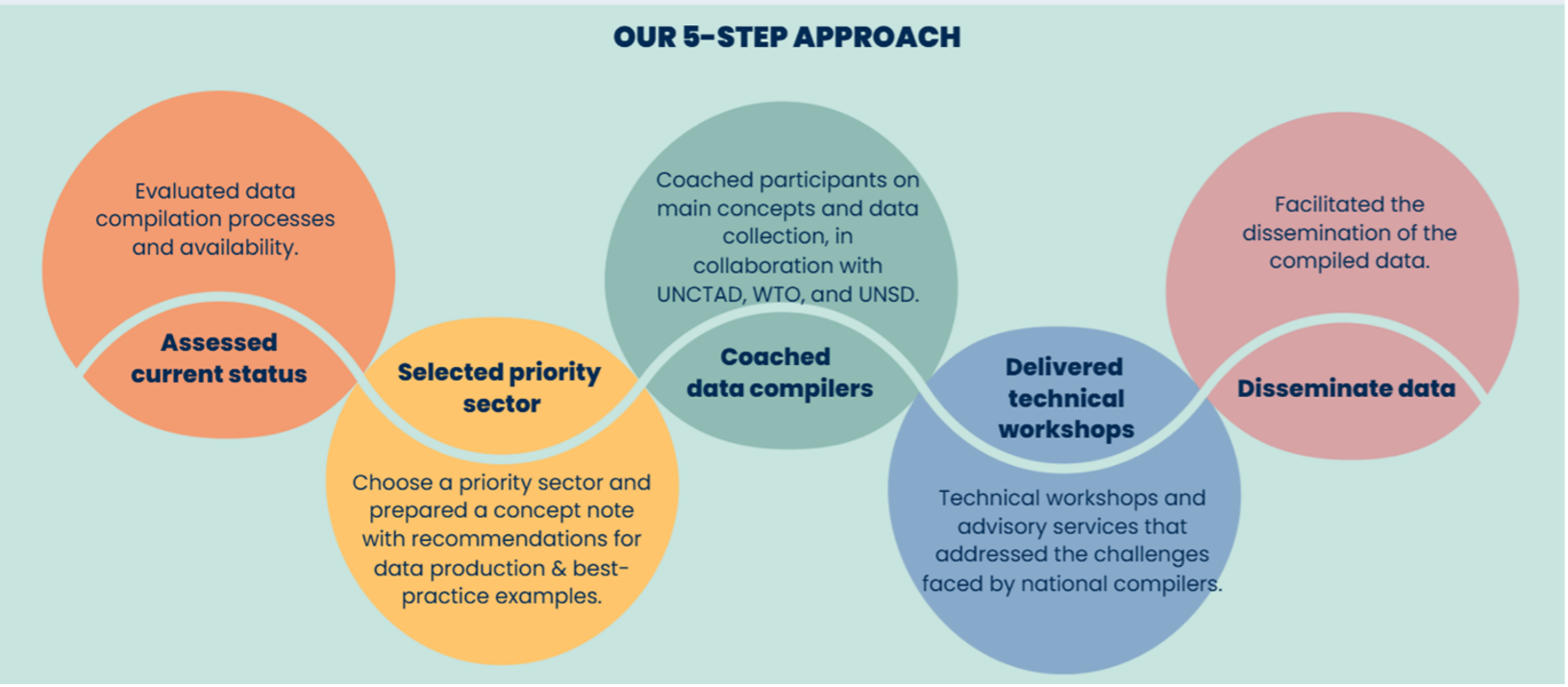 |
|
|
On December 10th, 2024, we also organised a regional technical workshop on trade in services statistics, during which the partners from Central Banks, National statistics offices and other national data providers, met together to share their experiences and share good practices."
|
|
|
Your colleague mentioned a regional workshop organized recently. How does improving data collection and fostering dialogue between stakeholders support trade policy development? What was done in this regard in the Euromed region? "Detailed data aids policymakers in crafting trade policies that benefit local service exporters and importers", stated Christophe Durand, Statistician, ITC.
"And to obtain more precise data, we should also facilitate the dialogue between statisticians and respondents of surveys, to make the data collection a win-win situation for all. This can be an immediate benefit for companies, making it easier for them to fulfill their legal obligation of reporting to national authorities. In the TIFM II project, each country focused on different sectors, which revealed the diversity of situations within the region. While Jordan chose to concentrate on transport, Palestine directed its attention towards travel, Egypt is working on manufacturing services, Tunisia on telecommunication, computer and information services, and Morocco is improving its data production of construction services. Aiming at measuring construction services with its main partner countries, Morocco is progressively switching to the company survey as the main source of data, for which it worked with ITC to simplify the questionnaire and to establish a dialogue between data compilers, business associations and construction companies. The initiation of this dialogue will certainly contribute to Morocco’s success in producing more detailed trade in services statistics."
We understand that the trade in services will be available through the Euromed Trade Helpdesk. Mohamed, you are one of the ITC trainers on Euromed Trade Helpdesk. Can you please tell us more about this tool? "The Euromed Trade Helpdesk is an online portal, implemented by the International Trade Centre and supported by the national public and private sector. It was designed to boost trade competitiveness and strengthen regional integration by providing free access to trade information for economic operators and policymakers. During TIFM II, the portal was enhanced with additional features and modules, allowing users to identify export opportunities and ask questions to a network of national institutions. And there is indeed a new module to see services statistics and much more! |
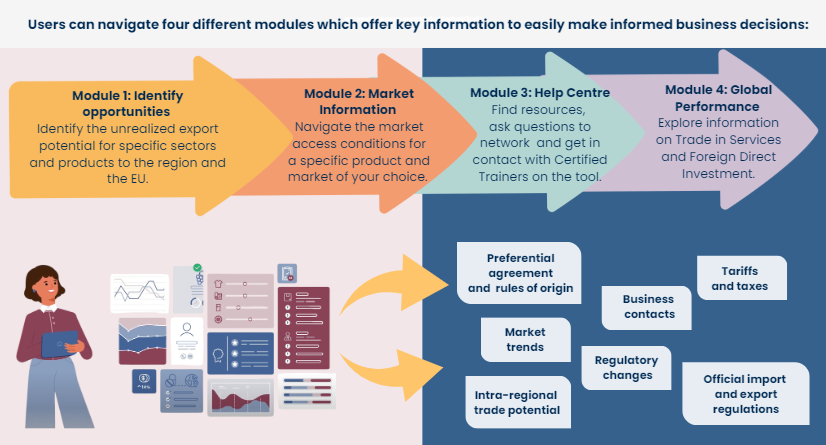 |
You can explore the Euromed Trade Helpdesk available in four languages, and register your account for free here. You can also watch our introductory video: Your trade success story starts here: Euromed Trade Helpdesk", added Mohamed Tarek Issa, Associate Programme Officer, ITC.
Ranime, you also had the chance to train national stakeholders under TIFM II. Can you tell us more about the Capacity Building programme and its certified trainers? "Certified trainers completed an intensive Capacity Building programme designed to enhance their expertise and foster independence in sharing knowledge. They were trained to use the Euromed Trade Helpdesk for in-depth market research and to excel in training others. The programme was structured into five steps, included two in-person workshops, three virtual sessions, and required a commitment of four to six months. Many trainers have been active in the field since 2022! You can connect with them through the Certified Trainers Dashboard. Create now your account to access their contact details." - Ranime Ibrahim, TIFM II Associate Programme Officer, ITC. |
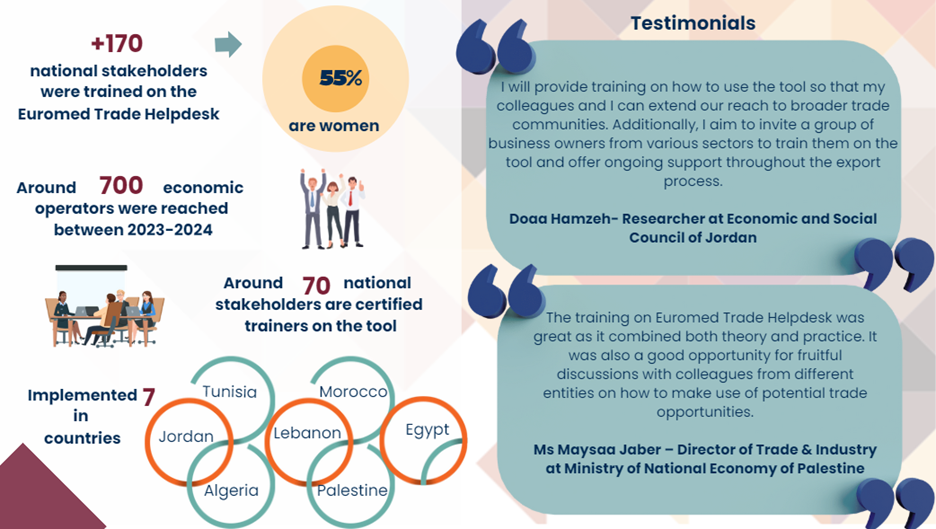 |
|
|
For more details of the achieved results, we invite you to watch this video: TIFM II celebrating 4 years of successful collaboration and achievements!
|
Interview by Laura Diaz, TIFM II consultant, ITC |
|
|
|
|
Celebrating the success of TIFM II |
|
|
On December 11th and 12th, the closure event of the TIFM II project brought together stakeholders from across the Mediterranean region to celebrate four years of impactful collaboration. ITC hosted this event, co-organized with the International Labour Organization.
The event provided a platform to reflect on the program’s achievements, which included uniting national policymakers, business support organizations, and government officials to address trade challenges and unlock growth opportunities. Central to the success of TIFM II were the efforts of national focal points and partners, who conducted surveys to identify trade barriers, improved statistical data in the services sector, and delivered reliable information through the Euromed Trade Helpdesk. The dedication of 70 certified trainers, whose ongoing work will guide economic operators in identifying trade opportunities, was also highlighted. As the curtain falls on TIFM II, its legacy promises to support the region’s economic growth for years to come. |
|
|
|
|
WEST AFRICAN COMPETITIVENESS OBSERVATORY Strengthening Trade Competitiveness Across West Africa: Regional and National Trainings & West African Competitiveness Observatory Project Conclusion |
|
|
In November 2024, TMI concluded the West African Competitiveness Observatory project, marking a significant milestone in enhancing regional trade capacity. The final updates to the Competitiveness module were completed, alongside the publication of comprehensive regional value chain guides focusing on five key sectors: vegetable butter for beauty products, infant food, fish, cotton apparel, and cassava. Throughout the last quarter, TMI organized impactful regional trainings to strengthen trade integration. A regional training in Dakar, Senegal (October 7–11), equipped policymakers from ECOWAS Francophone countries with tools for trade competitiveness and value chain analysis. This was followed by a Training of Trainers session in Cotonou, Benin (October 14–18), preparing Trade Promotion Organization (TPO) representatives to implement the WACOMP Business Matchmaking platform across the region, and a training for West African permanent missions in Geneva, Switzerland (November 25).
The Observatory's tools empowered participants of the trainings on competitiveness and regional value chain analysis to draft policy notes, eight of which were published on the WACOB platform. Newly trained TPO experts conducted national trainings for businesses on the Matchmaking platform in countries like The Gambia, Ghana, Liberia, and Senegal, enhancing local businesses' ability to seize cross-border opportunities. |
|
|
Partner institutions (ECOWAS, FEWACCI, Agence Côte d’Ivoire Export) and ITC presented the tool up at three trade fairs across the region. These efforts resulted in over 63,000 platform views and the creation of over 1,300 business profiles, fostering regional collaboration. As we conclude the WACOMP project, we celebrate these accomplishments and express gratitude to our partners for their support. We remain committed to furthering trade competitiveness and regional value chain development across West Africa in the future. |
|
|
| Visit the platform |
|
|
MARKET ACCESS, RULES AND REGULATIONS UNIT UKTP study on cumulation opportunities under UK preferential programs |
|
|
ITC has conducted the first in-depth assessment to identify concrete opportunities related to the key rules of origin (RoO) provisions: Cumulation. For the assessed region of West Africa - Cameroon and the target market of the UK, relying on ITC data and methodologies, the study identified potential trade opportunities for regional and UK businesses created by the cumulation provisions in the West and Central African EPAs and the new Developing countries trading scheme (DCTS). The scope of the study also included businesses in the EPA and DCTS countries within the region that supply inputs to goods finished in another country (SACU region in this study) and that produce finished goods to eventually export to the UK. |
|
|
|
AFRICAN TRADE OBSERVATORY New 'Monitor module' interface and Trade Policy simulation indicator |
|
|
On 10 December 2024, during the African Union (AU) African Industrialization Week in Addis Ababa, the African Trade Observatory (ATO) introduced two new functionalities, marking a significant enhancement to its role as a leading trade intelligence platform in Africa. Announced by the ITC-AU team, these updates strengthen the ATO’s capacity to support both policymakers and private sector stakeholders, supporting the AfCFTA framework. The newly launched public interface of the Monitor module provides open access to over 10 analytical indicators, including trade balance, market share, export orientation, level of processing, product diversification, and market diversification. These indicators complement the existing Compare and Explore modules enabling public users – ranging from businesses to trade organizations – to gain deeper insights into Africa’s evolving trade landscape. |
|
|
Additionally, a Trade Policy simulation indicator allows policymakers to assess the expected impact of AfCFTA implementation on African exports and imports over time. This indicator equips governments with actionable data to forecast trade flows and evaluate the effectiveness of policy changes.
These enhancements highlight the ATO’s continued evolution as a key enabler of Africa’s trade and industrial ambitions, empowering stakeholders to build stronger value chains and achieve sustainable economic growth. |
|
|
| Visit the ATO platform |
|
|
GLOBAL TRADE HELPDESK China Supply Chain Expo & launch of GTH Service Centre in Xiamen & Collaboration with SheTrades Hubs in Latin America and the Caribbean |
|
|
The Chinese edition of GlobalTradeHelpdesk.org was published in collaboration with the China Council for the Promotion of International Trade (CCPIT) Commercial Sub-Council and the China Electronics Chamber of Commerce in July 2024. On November 26-28, over 700 businesses from around the globe showcased their products and services at the second annual China International Supply Chain Expo in Beijing. Within the Expo, CCPIT hosted a dedicated session on Trade Development and Standards Cooperation which featured an introduction to the Chinese version of the Global Trade Helpdesk. Mr. Jack YAO, Secretary General of the CCPIT Commercial Sub-council, shared that “the Global Trade Helpdesk is an actionable and effective trade intelligence tool for fostering trade development and the standards cooperation initiative. As the initiative has been adopted in the BRICS Business Council Report 2024, the GTH can help SMEs not only in China, but also across other developing countries, including the BRICS.” |
|
|
The China Electronics Chamber of Commerce (CECC) on 5 December launched the Global Trade Helpdesk Service Centre in Xiamen, in Fujian Province. The CECC expressed its interest in equipping its members with access to trade and market information provided by the multiagency platform. This pioneering initiative is set to gather Chinese business directories, facilitate outreach programmes, and host capacity-building workshops tailored to support market diversification. In addition, the ITC Team also worked with CCPIT and CECC on GTH training sessions for over 1,200 participants representing businesses and government agencies in Qingdao, Binzhou, Changsha, Shanghai, and Xiamen. The GTH team also partnered with SheTrades Hubs in Latin America and the Caribbean to conduct trainings for firms and Training of Trainers for Hubs staff. The team also worked with the WTO and Trade4MSMEs platform to organize another joint open webinar in November. |
|
|
| Visit the Global Trade Helpdesk in Chinese |
|
|
EASTERN PARTNERSHIP INITIATIVE Partnering with Moldova Chamber of Commerce to train businesses to leverage new opportunities in the EU Market |
|
|
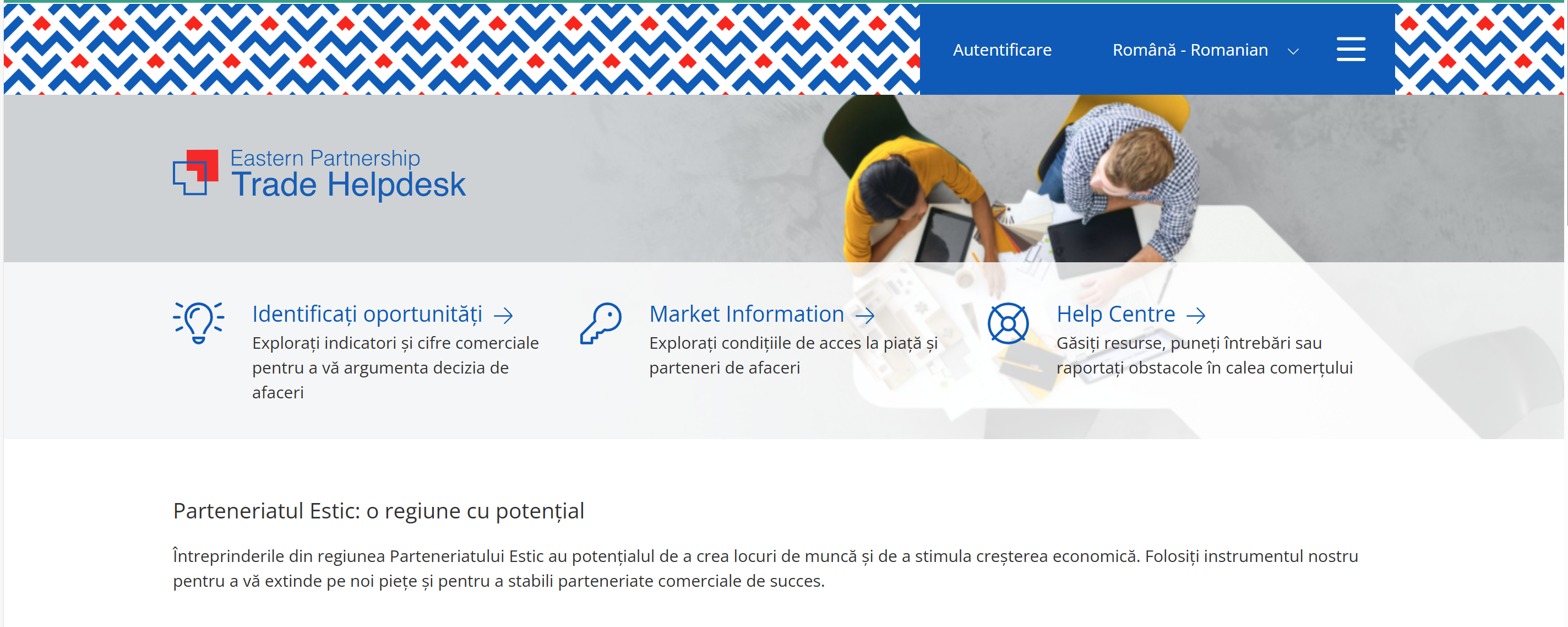 |
|
|
The Moldova Chamber of Commerce works to build skills of local businesses through their Export Academy programmes to help them grow throughout the region and beyond. In collaboration with the EaP Trade Helpdesk team, the Moldova Chamber team conducted two training sessions for firms in both Russian and Romanian in October. These sessions provided a hands-on introduction to the EaP Trade Helpdesk to assist firms in identifying and comparing opportunities for diversifying their exports across EU markets. The platform provides details on the economic attractiveness, market access conditions, as well as relevant tax information. While Moldovan firms have a strong performance in exporting to Romania, many other EU markets could also be attractive markets for Moldovan products and services.
|
| Explore the Eastern Partnership Trade Helpdesk |
|
|
CAPACITY BUILDING ON GLOBAL PUBLIC GOODS Two workshops on identifying trading opportunities under AfCFTA in Tunisia |
|
|
On November 19-20, ITC contributed to two workshops organized in collaboration with the Tunisian Ministry of Trade and GIZ-Tunisia in Sousse. 46 participants, of which 28 are exporting MSMEs, were trained on using ITC tools to analyze markets, identify opportunities, establish business contacts, and optimize their export strategies - for the sectors of agri-food and automotive. Additionally, participants gained a clearer understanding of eligibility criteria for rules of origin, preparing them to fully benefit from opportunities under the AfCFTA.
The trainings equipped Tunisian exporting companies to identify markets and understand eligibility criteria for rules of origin in Africa with the help of ITC tools, paving the way to a more optimal use of forthcoming AfCFTA opportunities. |
|
|
|
|
SME Trade Academy Online Learning: Empowering Global Trade Professionals in 2024 |
|
|
Once again, trade professionals around the world had the opportunity to enhance their skills for analysing international markets. In the last quarter of 2024, SMETA’s flagship online courses saw remarkable participation: 53 participants joined "How to Analyse Trade Flows", and 458 participants enrolled in "How to Access International Markets". These courses provide comprehensive introductions to ITC’s flagship market analysis tools Trade Map and Market Access Map.
Over the entire year, "How to Analyse Trade Flows" attracted 972 participants (425 women), while "How to Access International Markets" engaged 1,385 participants (603 women). This strong turnout reflects the global demand for expertise in trade analysis and market access, emphasizing the vital role of these tools in empowering SMEs and businesses of all sizes.
Trade Map and Market Access Map simplify complex trade data and foster data-driven decision-making, helping enterprises navigate international markets effectively. Building on 2024’s success, we are thrilled to announce another round of these popular courses starting in March 2025. Stay tuned for updates and join us to elevate your trade expertise. |
|
|
|
|
|
|
ITC TOOLS UPDATES Zooming in on trade in services data: Partner country breakdowns available for 56 countries |
|
|
Trade Map and other regional integrated solutions, among which the Eastern Partnership Trade Helpdesk and the Euromed Trade Helpdesk, feature updated international trade in services statistics. Thanks to the integration of additional national and international data sources, you can now analyse trade in services statistics with 2023 data for 133 countries. More granular insights are available with partner-country breakdowns for 56 countries. These enhanced statistics enable deeper market analysis. For example, you may assess the competitive landscape for professional and management consulting services in Thailand: Singapore currently leads the market but faces growing competition from the United States. Visit Trade Map to see how Singapore's market share in this sector has evolved in Thailand over recent years. |
|
|
Global merchandise trade data Celebrate the arrival of first snow with fresh trade data. The data for Q3 2024 is now available for 62 countries, covering 83% of global goods trade. For recent monthly data analysis, Trade Map displays data for 101 countries up to March 2024 and 83 countries up to June 2024. Are you more interested in fresh monthly data? Please do not hesitate to go Data Availability Page and discover most recent data for a product/country of your interest. As of mid-December 2024, October 2024 data for 23 countries, representing 35% of global goods trade. |
|
 |
Chart: Latest period available for annual data, number of countries and share of global trade they account for. |
|
|
Global Trade Indicators 2023 The third update of the 2023 global trade indicators was released on 5 December. Eager to explore the latest trade trends? Look no further than Trade Map—your go-to resource for the most up-to-date insights. Dive into recent developments for any product or country of interest. The 2023 indicators now feature data from 157 countries (marked in blue on the map), including 13 newly published this quarter, covering over 96% of global goods trade.
Check the Trade Map database and learn more with the updated Trade Map indicators. |
|
|
| Visit Trade Map |
|
|
| See data availability for your country |
|
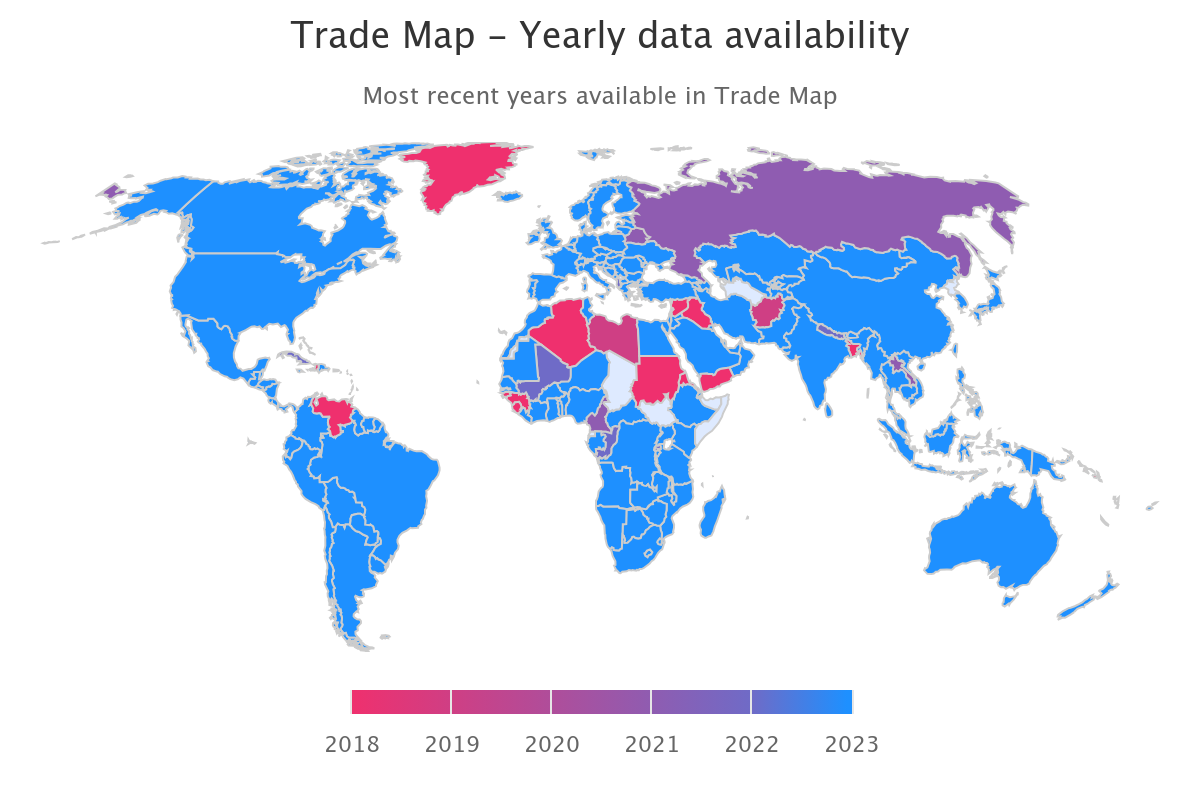 |
Note: Latest country data available as of 16th December 2024. For further updates, kindly visit the Data Availability page. |
|
|
|
|
|
|
|
|
|
|
© 2024 All Rights Reserved |
|
|
|
|